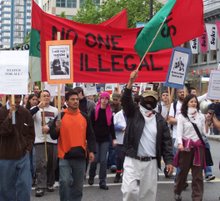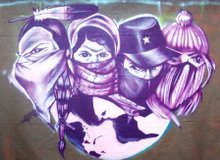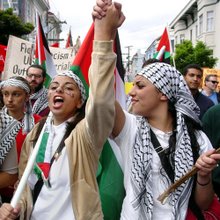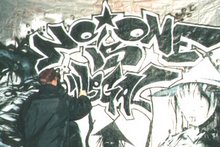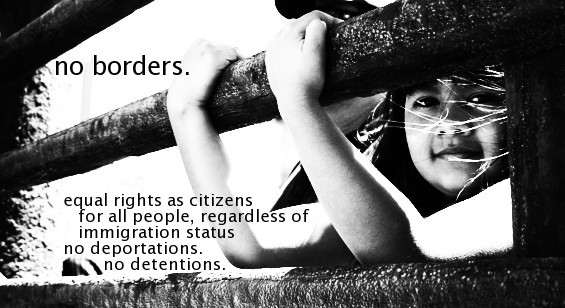Friday, June 29, 2007
Blockades up as aboriginal day of action begins
Armed Mohawk protesters got an early start to the Canada-wide aboriginal day of action on Friday, barricading a major rail line and a highway in eastern Ontario. The protesters' swift action caused police to shut down a one kilometre stretch of Highway 401, the major road link between Toronto and Montreal, at midnight, fearing protesters would move to that portion of the road.
The highway was closed to all traffic between the towns of Maryville and Shannonville, which are about 60 kilometres west of Kingston. "The highway was closed as a safety measure," said Christine Rae, a spokeswoman for the Ontario Provincial Police. Traffic was being re-routed, and police could not anticipate when the highway would reopen. The protesters set up their first barricade at 9 p.m. ET on Thursday, three hours before the day of action officially began, parking a schoolbus on Highway 2, a secondary route near Deseronto, and lighting a bonfire nearby.
(Click here to read more)
Threats and Opportunities by Noam Chomsky
Regrettably, there are all too many candidates that qualify as imminent and very serious crises. Several should be high on everyone’s agenda of concern, because they pose literal threats to human survival: the increasing likelihood of a terminal nuclear war, and environmental disaster, which may not be too far removed. However, I would like to focus on narrower issues, those that are of greatest concern in the West right now. I will be speaking primarily of the United States, which I know best, and it is the most important case because of its enormous power.
But as far as I can ascertain, Europe is not very different.The area of greatest concern is the Middle East. There is nothing novel about that. I often have to arrange talks years in advance. If I am asked for a title, I suggest “The Current Crisis in the Middle East.” It has yet to fail. There’s a good reason: the huge energy resources of the region were recognized by Washington sixty years ago as a “stupendous source of strategic power,” the “strategically most important area of the world,” and “one of the greatest material prizes in world history.” Control over this stupendous prize has been a primary goal of U.S. policy ever since, and threats to it have naturally aroused enormous concern.
(Click here to read more)
Thursday, June 28, 2007
Why Boycott Israel? Because It’s Good for You
The boycott, divestment, and sanctions (BDS) movement against Israel’s Apartheid scored an important victory recently when the British University and College Union (UCU) decided to circulate “the full text of the Palestinian boycott call to all branches for information and discussion” and “encourage members to consider the moral implications of existing and proposed links with Israeli academic institutions.” The UCU resolution is in fact quite moderate. Nevertheless, it raised the profile of the campaign and elicited a round of shrill, wall-to-wall condemnations, from newspapers, foundations, politicians and governments. Shockingly, not a single media mogul (or any mogul, for that matter) is in favor of the boycott!
The major argument for boycotting Israel is that it is the right thing to do. And it is. But for those of us who live off wages and depend on public services, it is also the smart thing to do — especially in Europe, where the BDS campaign is now facing a vocal onslaught. Support for Israel is an important pillar of an islamophobic, anti-immigrant and pro-war front, which includes many in the political leadership of Europe; their final prize is finishing off the welfare state. In the second part, I will also show that it is this front — not the UCU — that is heir to Europe’s historical anti-Semitism.
(Click here to read more)
Black Americans on opposite sides of immigration debate in South LA
A group of 100 marchers waving American flags headed south on Crenshaw Boulevard on Saturday to protest illegal immigration and what they called its damaging effects on the black community.But they never reached the park that was their destination, and the rally turned into two tense hours of confrontation under a hot sun with counter-protesters on the opposite side of the street. Insults and epithets flew across the asphalt as hundreds of Los Angeles Police Department officers kept guard. Although some people expressed concern about another May 1 melee, in the end, police earned praise for their restraint and efforts to calm the crowd.Police defused the standoff, both sides dispersed and five people, including organizer Ted Hayes, a longtime activist for the homeless, were arrested peacefully.
The marchers, made up of black activists and Minutemen, homeless people and neighborhood residents, held a city permit for an afternoon rally at the historic Leimert Park in the Crenshaw district. Nearly 500 counter-protesters, mostly black and Latino, some with Mexican flags and others with antiwar placards, swept down the other side of Crenshaw Boulevard. They converged on the park first and blocked the original marchers from entering. Some said they had heard those marchers would include KKK members, and the counter-protesters denounced what they called racist outsiders trying to incite violence.
(Click here to read more)
Sunday, June 24, 2007
Displacement in Palestine: Everything is Possible
It feels strange to discuss possible solutions to the Israeli-Palestinian conflict. Do we prefer a one-state formula or two states, one next to the other? Which of the two solutions is more possible? These questions sound so remote from the harsh reality on the ground, where a resolution of the conflict never seemed so distant. Currently, Israel is dramatically and unilaterally changing the regional landscape. The project misleadingly called the "Security Fence" is perpetuating and vastly expanding the colonies Israel has established in the areas it occupied in 1967, while sacrificing a handful of settlements located in the remote and most populated Palestinian areas. The project also complements the system of Jewish-only roads and numerous checkpoints that already fragment the West Bank -- it concentrates the Palestinians in densely inhabited, impoverished enclaves, and ensures complete Israeli control over the region's most precious resources: open land and water.Many Palestinian communities in the West Bank are already fenced in from all sides (and sometimes also cut in the middle) by a system of trenches, concrete walls and barbed-wire fences. Gaza too is sealed. Movement between the Palestinian pockets is extremely difficult. Access to healthcare, education, and work is limited and in some cases impossible. Poverty is everywhere (60 percent of the population is under the UN poverty line of two dollars of income a day).
In a matter of months, the project will be successfully completed. It will lock the Palestinians in small ghettos, connected by subterranean roads that will be controlled by Israel. There will be no airport, seaport, and the passage by land to neighboring countries will be manned by Israeli soldiers. The end result -- already in place in the Gaza Strip and several West Bank "strips" -- is a system of crowded, open-air prisons. And if the inmates will get out of hand and revolt, the wardens will target them with air raids and artillery shells. Note that what is happening in the territories occupied in 1967 is not essentially new. The Israeli-Palestinian conflict is not 40 years old but 120 years old. Throughout this period, the Israeli Yeshuv-turned-state used a variety of means to seize as much land as possible and displace or strangle the native population. A major breakthrough in this effort took place during the 1948 War, when at least 700,000 Palestinians either fled in fear or were forced out of their towns and villages at gun-point. Their homes were systematically razed to the ground by the newly founded sate of Israel and they were not allowed to return.
(Click here to read more)
Saturday, June 23, 2007
The Life and Death of a Border Town
In the town of Nuevo Laredo, Mexico, close to the U.S. border, two streets intersect: one is called Progreso (Progress) and the other is Fabrica (Factory). They are aptly named streets because they are thoroughfares that only house manufacturing plants called maquiladoras - giant mall sized buildings ringed with fences and with guardhouses posted out front. There are no houses or shops here – indeed, the sidewalks on Progreso and Fabrica are empty, and the only noise that can be heard during a workday are the trucks that drop off supplies and pick up finished goods. Some of the factories belong to well-known companies like Caterpillar or Sony, others to less well-known companies like Delphi. Early every morning at the beginning of the workday, special buses arrive from specific neighborhoods carrying workers, while others arrive in their own vehicles. They are smartly dressed young women and men whose jobs range from assembling videotapes to refurbishing defective machines.
The factories are huge, employ thousands of workers and do brisk business. It is hard to imagine that they could ever pack up and leave, but it is a distinct possibility in the chaotic world of border economics. The number of maquiladoras began increasing in Nuevo Laredo and other border towns after the North American Free Trade Agreement, or NAFTA was signed in 1994. At the time there was much ado about NAFTA, and "free trade" entered the popular lexicon, with its proponents claiming it would bring prosperity to the impoverished population of Mexico, and its detractors predicting doom for U.S. workers and their Mexican counterparts.
(Click here to read more)
The Crisis in Gaza: Made in Israel, Not a Civil War
The old dream of Ariel Sharon is becoming a reality: Palestinians are killing Palestinians, and Israel is counting the number of victims with great satisfaction. The tears of Israeli leaders are crocodile tears, and their claims that they are sorry for the tragic developments in Gaza are mere hypocrisy. The bloody confrontations were predictable, and the Israeli-US responsibility and active involvement are crystal clear. Many Israeli journalists are analyzing Israel’s responsibility as indirect: “1.4 million people closed in a small territory like Gaza, without any possibility to have normal economic life, but also without the possibility of escape, are doomed to kill each other… like mice closed in a box.” That zoological explanation is not only typically racist, but also based on a huge understatement.
For, the Israeli and US role in the present confrontations was much more than simply “creating the conditions” for an inner-Palestinian conflict.For months, the US State Department has been pushing the Fatah leadership to launch a military offensive against Hamas, and two weeks ago, Israel was giving a green light to the entry of huge quantity of arms for Fatah militias in Gaza. In that sense, the Israeli part in the present situation is not only conjectural, but an active role.
(Click here to read more)
Choices for Black labor
I came of age politically in the middle of the Black Power movement. Within the ranks of organized labor, both the Black Power movement and the Anti-Vietnam War movement had a significant impact through the mid1970s. Caucuses were being formed to challenge the bureaucratic leaderships of many unions. Wild-cat strikes were taking place in workplaces around the country. And in some locales, independent unions were being established where workers had concluded that the established union movement was incapable of making any significant changes to address the needs and demands of rank and file workers. At the national level, the Coalition of Black Trade Unionists emerged as a major voice arguing that organized labor needed to take a new and different look at the Black worker, a look and engagement that was based on the need for respect and equality.
As we enter the 21st century, Black labor is in disarray. Within the ranks of organized labor, the various institutions that have often spoken on its behalf have ossified. Black caucuses in various unions have stepped back from challenging and pushing the union leaderships and instead have in all too many cases degenerated into social clubs or step-ladders for individuals to get positions in the union structure. While there are greater numbers of Black staff and, in some cases, elected leaders, there is an emphasis on acceptability—to the leadership of organized labor—within the ranks of the movement, rather than an emphasis on challenge and struggle.
(Click here to read more)
India Will Have 400 million Agricultural Refugees
It was on the cards. With Prime Minister Manmohan Singh announcing the formation of a new rehabilitation policy for farmers displaced from land acquisitions, it is now official -- farmers have to quit agriculture. Ever since the Congress-led UPA Coalition assumed power after an angry rural protest vote threw out the erstwhile BJP-led NDA combination in May 2004, the Prime Minister had initiated a plethora of new policies for the spread of industrialization. After having laid the policy framework that allows private control over community resources – water, biodiversity, forests, seeds, agriculture markets, and mineral resources -- the UPA government finally looked at the possibility of divesting the poor people of their only economic security – a meagre piece of land holding.
“Special Economic Zone (SEZ) is an idea whose time has come,” the Prime Minister had said at an award ceremony in Mumbai sometimes back. Supported by all political parties, including the Left Front, he has actually officiated a nationwide campaign to displace farmers. Almost 500 special economic zones are being carved out (see The New Maharajas of India). What is however less known is that successive government’s are actually following a policy prescription that had been laid out by the World Bank as early as in 1995.
(Click here to read more)
Monday, June 11, 2007
Iraq government orders arrest of oil workers' leaders
Iraq's powerful oil workers' trade union today expressed alarm as an arrest warrant was issued for its leaders, in an attempt to clamp down on industrial action. Members of the union have been on strike since Monday 4th June, in protest at the government's failure to meet any of its promises made in a meeting with Prime Minister Nouri al-Maliki on 16th May. The union's 16 demands included improvements to wages, health and other working and living conditions as well as consultation on the proposed oil law, which the union opposes. The union added a 17th demand yesterday demanding the sacking of the General Manager of the Southern Pipeline Company.
On Tuesday, al-Maliki warned that he would meet threats to oil production "with an iron fist". The arrest warrant, based on a charge of "sabotaging the economy" specifically names Hassan Juma'a Awad, the leader of the 26,000-strong Federation of Oil Unions, and three other leaders of the Federation. Hassan Juma'a commented, "the government is intimidating the union but we are determined to gain our legitimate rights." He added that the strike would continue in accordance with the union's plan.
(Click here to read more)
Canada: 40% percent of military contracts are “non-competitive
(Ottawa) Federal spending on multi-billion dollar military contracts has been mired in complaints of improper conduct as the government embarks on its $17 billion build-up of aircraft, helicopters, warships and vehicles. A study released today by the Canadian Centre for Policy Alternatives called “No Bang for the Buck: Military contracting and public accountability” supports the frequently heard charges of unfair competitions. It found that the government itself has classified more than 40 percent of the nearly 20,000 National Defence contracts awarded in FY2006-07 as “non-competitive.”
Even more, the percentage of public dollars spent on “non-competitive” military contracts has doubled in the last two years, according to the study which examined thousands of federal contracts reported in the Business Access Canada’s publicly available Contract History database.“This report raises the alarm on the use of public dollars, and the need for greater transparency and federal accountability in military contracting,” said Bruce Campbell, Executive Director of the CCPA.
(Click here to read more)
“Two States Or One State” By Uri Avnery & Ilan Pappe
A debate between former Knesset Member Uri Avnery and Doctor Ilan Pappe .moderator: Professor Zalman Amit.
Zalman Amit: Greetings to you all, and thanks for coming to be with us this evening.
First of all, I would like to thank Teddy Katz, who initiated this event and did a large part of the logistics involved. I would not be exaggerating in stating that the subject we discuss today is the most important and most difficult question facing people on the left side of the political spectrum, and those whom we could broadly call the people of the peace movement. I also think we are lucky in having tonight two speakers who are perhaps the most clear representatives, respectively, of the two approaches and worldviews to whose debate this evening is devoted. To my right is Dr. Ilan Pappe, historian of Exeter University, formerly of Haifa University. [Pappe corrects: Not yet formerly]. To my left is Uri Avnery, former Knesset Member, former editor of Haolam Hazeh Weekly, and present activist in Gush Shalom.
(Click here to read more)
Tuesday, June 5, 2007
SPP: NAFTA Kicked Up A Notch
NAFTA Kicked Up A Notch by Laura Carlsen
The North American Free Trade Agreement is the world's most advanced example of the U.S.-led free trade model. It's not just about economics any more. The expansion of NAFTA into the Security and Prosperity Partnership reveals the road ahead for other nations entering into free trade agreements. It is not a road most nations -- or the U.S. public -- would take if they knew where it led.
The first problem is that very few people know about this next step of "deep integration." In March 2005, Presidents George Bush, Vicente Fox and Prime Minister Paul Martin in Waco, Texas launched the Security and Prosperity Partnership with a splash. Although it had few visible results, the Waco meeting of the "Three Amigos" set into motion an underground process that spawned its own working groups, rules, recommendations, and agreements -- all below the radar of the legislatures and the public in the three nations. These rules and trinational programs have profound effect on the environment, the daily lives of citizens, and the future of all three countries. The SPP not only further greases the wheels of corporate cooperation and potentially increases U.S. access to Mexican oil. Its security component represents a new and ominous form of integration, all in the name of counter-terrorism.
(Click here to read more)G8 NEWS: Information on the Migration Day of Action
G8 NEWS: Information on the Migration Day of Action — "We are here because youare destroying our countries!"
Movements of refugees and migrants are increasing worldwide. From Los Angeles to Paris to Seoul, no one can ignore the global dimension and growing significance of migrants and refugee struggles. These struggles are as much a reaction to the massive plundering and continuing devastation in the global south by the north as they are a demand for social equality. It is precisely the G8 governments, together with transnational corporations and international organisations like the WTO,IWF and World Bank, that are responsible for not only maintaining a global apartheid regime, but also for solidifying and intensifying it.
"We are here because you are destroying our countries " is the slogan of refugee organizations, which is directed toward the whole array of theG8's neocolonial strategies: Against debt policies which impose price increases and privatization measures under so-called structural readjustment programs; against the devastation of local economies leading to increasing impoverishment of these countries; against the plundering of their resources; and last but not least, against the direct or indirect support of dictators and warlords.On June 4th, beginning in the early morning, actions related to theissue of migration will take place all over the city of Rostock.
(Click here to read more)Baghdad Burns, Calgary Booms by Naomi Klein
Baghdad Burns, Calgary Booms by Naomi Klein
The invasion of Iraq has set off what could be the largest oil boom in history. All the signs are there: multinationals free to gobble up national firms at will, ship unlimited profits home, enjoy leisurely "tax holidays" and pay a laughable 1 percent in royalties to the government. This isn't the boom in Iraq sparked by the proposed new oil law--that will come later. This boom is already in full swing, and it is happening about as far away from the carnage in Baghdad as you can get, in the wilds of northern Alberta. For four years now, Alberta and Iraq have been connected to each other through a kind of invisible seesaw: As Baghdad burns, destabilizing the entire region and sending oil prices soaring, Calgary booms.
Here is how chaos in Iraq unleashed what the Financial Times recently called "north America's biggest resources boom since the Klondike gold rush." Albertans have always known that in the northern part of their province, there are vast deposits of bitumen--black, tarlike goo that is mixed with sand, clay, water and oil. There are approximately 2.5 trillion barrels of the stuff, the largest hydrocarbon deposits in the world.
Shut Down of Immigration Detention Center in Houston
Protest of Immigration Detention Center in Houston
Today, June 4th, the Dissent! Network in Europe has called for a Global Day of Action for freedom of movement and equal rights for all! We here in Houston, Texas, USA have heard this call to action and share the same concerns as our brothers and sisters in Europe and all over the world who are taking action today in solidarity with migrants and refugees of the global economy.
Here in the United States, a rising xenophobic sentiment in large parts of the population is being fed and exploited by politicians who are scapegoating immigrants and this system that is stratifying the working class. To this end we have chosen to commit an act of civil disobedience, blocking gates to the "Houston Processing Center"; an Immigrant Detention Facility in North Houston run by the Corrections Corporation of America (CCA). CCA is a company that turns a profit of over a billion dollars a year by administering prisons for state and federal governments. They run the notorious Don T. Hutto Facility in Taylor Texas, a converted jail that imprisons asylum seekers and children. These children are subject to inhumane treatment and ICE/CCA denied access to the United Nations Special Rapporteur on the Human Rights of Migrants this past month as he tried to investigate the conditions at the Hutto Facility. By the fall of 2007 ICE will spend an estimated 1 billion dollars a year to detain over 27,500 people. ICE operates eight Service Processing Centers and seven contract detention facilities such as Hutto, Raymondville and the Houston Processing Center, all three run by CCA. We decided we had to put our bodies on the line in an effort to slow down and expose the oppression and exploitation of immigrants by the capitalist economic order, the US Government and the US Prison Industrial Complex. We condemn the policies of the Immigration and Customs Enforcement and the Corrections Corporation of America. We recognize this escalation of raids and deportations are not a fundamentally new development, but part of a continued effort to terrorize our communities for the sake of maintaining an unjust social order.
(Click here to read more)Canada in Afghanistan
Canada in Afghanistan By MICHAEL NEUMANN
For many Canadian partisans of The Mission in Afghanistan, Canada is just fighting the good fight. Their attitudes are curiously anachronistic, as if our boys have gone off to stick it to Jerry. There are yellow-ribbon support-our-troops stickers on many cars; there's home town pride. Embedded correspondents produce little more than a stream of human interest pieces, as if Afghanistan was some enormous Katrina aftermath. You'd probably find something similar in Norway, Finland, and other Nice Countries that have sent troops over there. Perhaps Americans would feel the same way were the whole Afghanistan question not obscured by the much more spectacular disaster of Iraq.
The opponents of The Mission sound wimpy. They say it's not a peace-keeping operation-- so what? Is nothing else ever justified, under any circumstances? They point out that the mission doesn't have popular support. Again, so what? Can't something unpopular be right? They claim it helps the Americans, but the Americans, really, are beyond help, and Canadian assistance isn't about to turn US idiocy into success. They protest that civilians are being killed. True: one might add that 'collateral damage' is a rather abstract way to describe tearing off a child's face and going 'oops'. However all modern wars, because they involve air power, inevitably involve collateral damage, so only a complete pacifist could find this objection decisive. Should we not tell other countries or societies how to run their lives, ever? How about Rwanda?
(Click here to read more)
